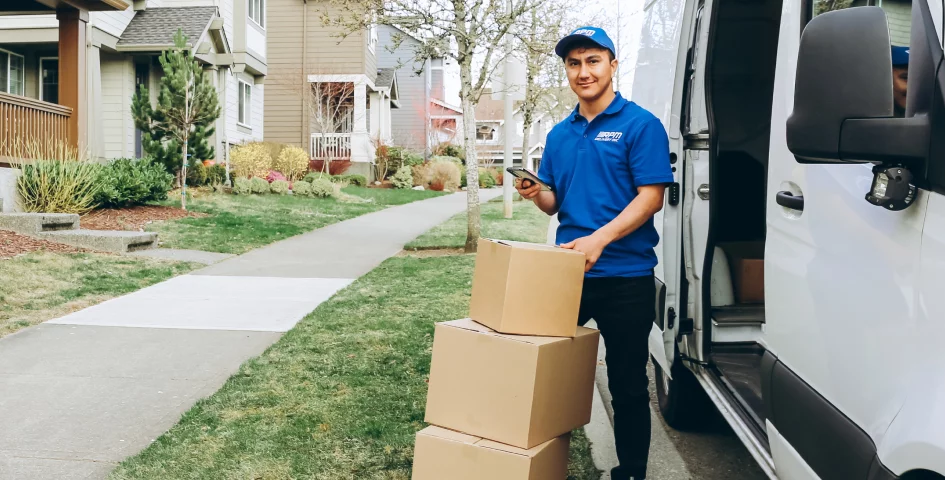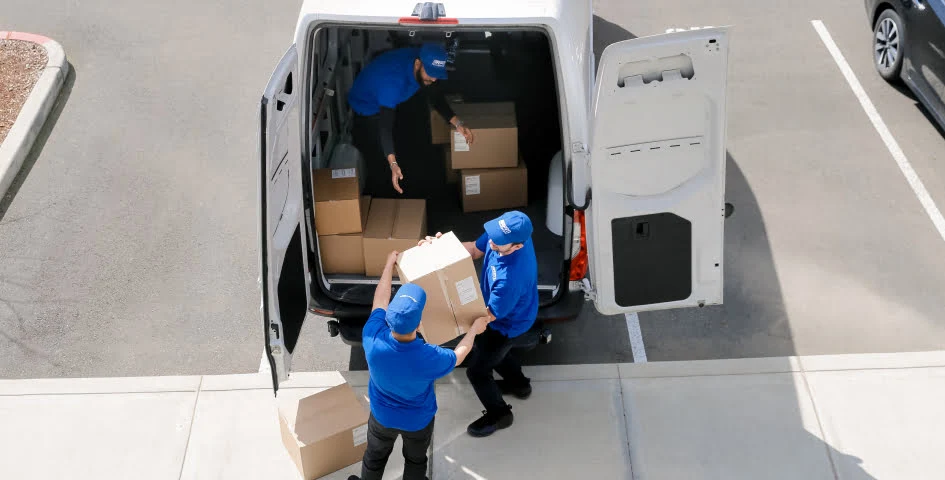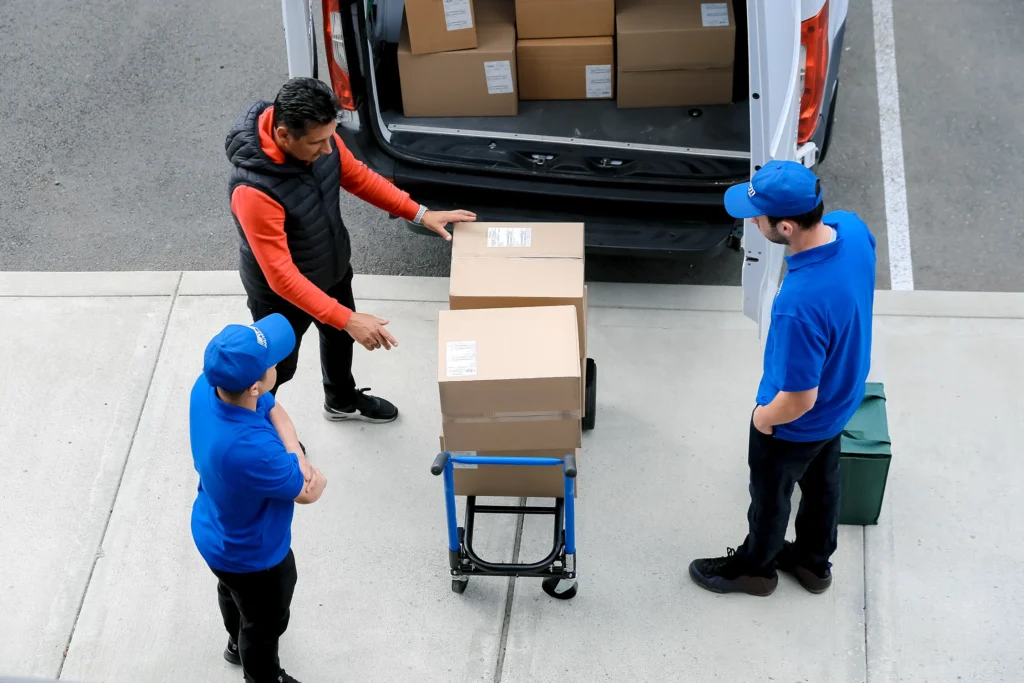Last Mile Delivery Solutions for e-Commerce Companies

The final leg of the delivery journey holds paramount significance for e-commerce. In this article, we will examine the dynamic landscape of last-mile delivery solutions tailored for e-commerce businesses. We will explore the challenges and strategies of this transportation mode and introduce a few sustainability features that can change the game for last-mile delivery.
Understanding Last-Mile Delivery
Last-mile delivery is the last phase of the delivery and transportation process, which involves moving freight from a local hub or distribution center to the final destination, usually a residential or business address. The trip from the closest fulfillment center to the customer’s house or selected pickup location is included in this phase. Last mile delivery, as part of the supply chain, is frequently regarded as the most critical and demanding because of its direct influence on customer satisfaction, operational expenses, and environmental sustainability.
Importance of the Last Mile in the Supply Chain
Last-mile delivery is a vital transportation method for the e-commerce industry for several reasons.
- Customer experience. A flawless last-mile delivery experience has a big impact on brand reputation, customer loyalty, and satisfaction.
- Cost efficiency. Logistics costs are largely attributed to last-mile delivery, which can account for as much as 50–60% of total delivery costs.
- Speed and timeliness. Efficient last-mile delivery guarantees that consumers receive their orders on time and that their expectations regarding turnaround times are met.
- Competitive advantage. Businesses that succeed in last-mile delivery have a market advantage. In a competitive market, providing excellent delivery experiences, like same-day or next-day delivery options, can draw in and keep customers.
- Sustainability. Last-mile delivery’s effects on the environment, such as traffic and car emissions, are causing increasing concern. Implementing sustainable practices in last-mile logistics can reduce carbon footprints and contribute to environmental conservation efforts.

Challenges in Last-Mile Delivery
E-commerce businesses and logistics providers face a number of challenges to overcome when it comes to last-mile delivery in order to guarantee effective and satisfying delivery experiences for clients. It will take strategic planning, infrastructure, and technology investments, as well as a dedication to sustainability and customer satisfaction, to overcome these obstacles. E-commerce businesses and logistics suppliers can improve their last-mile delivery operations and strengthen their competitive edge in the market by aggressively tackling these issues.
- Traffic congestion and urbanization. As more people live in cities, traffic congestion poses a serious threat to last-mile delivery services that are efficient and reasonably priced. Urban settings present particular difficulties, such as congested streets, scarce parking, and restricted entry points, which can make it difficult for delivery trucks to maneuver freely. Congested city streets raise the danger of delays and missing deliveries while also increasing delivery times, fuel consumption, and operating expenses.
- Cost implications for e-commerce companies. Last-mile delivery is often the most expensive segment of the supply chain, accounting for a substantial portion of logistics costs. The high operational costs of last-mile delivery are caused by a number of factors, including fuel pricing, labor costs, vehicle upkeep, and insurance fees. The increasing expenses of fulfillment and delivery services put pressure on e-commerce businesses to balance competitive pricing, which might affect their profit margins and long-term viability.
- Customer expectations for fast and reliable delivery. Today, customers expect prompt and dependable delivery services and same-day or next-day delivery alternatives are becoming increasingly popular. Real-time tracking capabilities, optimal delivery routes, and effective logistics operations are necessary to meet these higher demands. Any last-mile delivery delays or disruptions can result in customer discontent, bad reviews, and even possible business loss.
- Environmental concerns and sustainability. Delivery vehicles contribute to air and noise pollution, greenhouse gas emissions, and traffic congestion, particularly in densely populated urban areas. Businesses are under increasing pressure to implement sustainable practices, like using eco-friendly packaging materials, electric or alternative fuel vehicles, and route optimization to cut down on mileage, in order to solve these issues.
Strategies for Efficient Last-Mile Delivery
Implementing different strategies can enhance the efficiency and effectiveness of last-mile delivery for any e-commerce company. By utilizing the following approaches, businesses can enhance delivery operations, meet customer needs, and gain a competitive edge on the market.
Micro-Fulfillment Centers
Compact warehouses or micro-fulfillment centers (MFCs) are located near major cities or high-demand locations. They allow quicker order processing and shorter delivery routes. The benefits of MFCs are:
- Shorter delivery periods. MFCs provide faster order fulfillment and shorter delivery periods by putting inventory closer to customers.
- Cost savings. By reducing the transportation costs related to larger delivery distances, MFCs minimize logistical costs.
- Scalability. MFCs provide e-commerce businesses with the flexibility and scalability they need to adjust to seasonal fluctuations in demand.

Collaboration with Third-Party Logistics Providers
By collaborating with 3PLs, e-commerce businesses can leverage their experience in last-mile logistics and existing delivery networks. Advantages of collaborating with 3PLs include:
- Expanded reach. 3PLs often have extensive networks and resources for last-mile delivery, allowing e-commerce companies to reach a wider customer base.
- Operational efficiency. 3PLs are experts in logistics management and are able to reduce transportation expenses, streamline delivery routes, and enhance delivery quality.
- Scalability. E-commerce businesses can grow their operations without spending more money on new infrastructure or staff by contracting with 3PLs to handle last-mile delivery.
Crowdshipping and Peer-to-Peer Delivery Models
Peer-to-peer delivery models and crowdshipping use individuals or independent contractors to help with last-mile deliveries, using the power of the sharing economy. These models provide the following benefits:
- Flexibility. Crowdshipping platforms allow flexible scheduling and route optimization, enabling the distribution of delivery duties according to availability and proximity.
- Cost-effectiveness. E-commerce businesses can minimize delivery expenses and maximize resource usage by utilizing a wide network of couriers or drivers.
- Community engagement. Because peer-to-peer distribution models frequently involve people familiar with the neighborhoods and preferences in the area, they foster a sense of community and trust.
Sustainability in Last-Mile Delivery
Sustainability in last-mile delivery refers to a range of initiatives aimed at minimizing environmental impact while maintaining operational efficiency. The adoption of alternative fuel and electric vehicles for transportation is one of the most important factors. Last-mile delivery fleets can reduce their environmental impact even more by using alternative fuels like biofuels or hydrogen fuel cells, which provide renewable energy alternatives.
Using eco-friendly materials and packaging is also a crucial component of last-mile delivery sustainability. Using packaging materials that are recyclable, biodegradable, or compostable helps reduce waste production and environmental contamination. Sustainable packaging solutions not only reduce the ecological impact of shipping but also resonate with environmentally conscious consumers who prioritize eco-friendly practices. By embracing green packaging initiatives, an e-commerce business can align its operations with sustainable development objectives and promote a circular economy mindset within the logistics industry.
Choose RPM Delivery for Comprehensive Last Mile Solutions
Choose RPM Delivery as your last-mile delivery provider for unparalleled efficiency, reliability, and sustainability. With our extensive network of vehicles, we ensure swift and secure delivery of your packages. Our expertise and years of work with different industries and e-commerce businesses allow us to create tailored last-mile solutions that will fit your needs. Trust RPM Delivery to deliver your goods with care, precision, and a commitment to your clients.